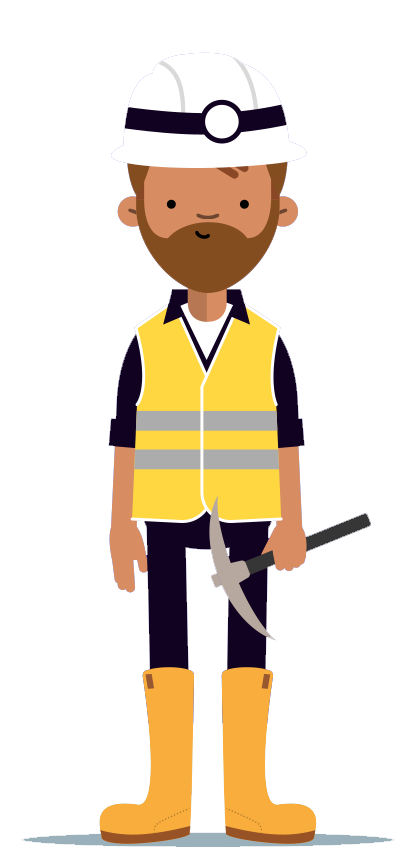If you’re a
miner it pays to
learn what you
can claim
To claim a deduction for work‑related expenses:
• you must have spent the money yourself and weren’t reimbursed
• it must directly relate to earning your income
• you must have a record to prove it.*

You can only claim the work‑related portion of an expense.
You can’t claim a deduction for any part of an expense that does not directly relate to earning your income.
* You can use the myDeductions tool in the ATO app to keep track of your expenses and receipts throughout the year.
Car Expenses
You can’t claim the cost of normal trips between home and work, even if you live a long way from your usual workplace or have to work outside normal business hours.
You can claim the cost of using a car you own when you drive:
- directly between separate jobs on the same day – for example, you work for two different employers
- to and from an alternate workplace for the same employer on the same day – for example, travel from a depot to a mine site.
In limited circumstances, you can claim the cost of trips between home and work, such as where you carry bulky tools or equipment for work. You can claim a deduction for the cost of these trips if all of the following apply:
- the tools or equipment are essential to perform your employment duties and you don’t carry them merely as a matter of choice
- the tools or equipment are bulky, meaning that because of the size and weight they are awkward to transport and can only be transported conveniently by the use of a motor vehicle
- there is no secure storage for the items at the workplace.
If you claim car expenses, you can use the logbook method or the cents per kilometre method to calculate your deduction.
If you use the logbook method, you need to keep a valid logbook to work out the percentage of work‑related use along with written evidence of your car expenses.
If you use the cents per kilometre method, you need to be able to show how you calculated your work‑related kilometres and that those kilometres were work related.
If you claim your work‑related car expenses using one of the above methods, you can’t claim any further deductions in the same tax return for the same car – for example, petrol, servicing, and insurance costs.
Clothing and Laundry Expenses
(incl footwear)
With a few exceptions, clothing can’t be deducted as a work‑related expense.
You can’t claim the cost to buy, hire, repair or clean conventional clothing you wear for work, even if your employer requires you to wear it and you only wear these items of clothing at work. ‘Conventional clothing’ is everyday clothing worn by people – for example, jeans, drill shirts and plain pants.
You can claim the cost to buy, hire, repair or clean clothing if it is:
- protective – clothing with protective features and functions that you wear to protect you from specific risks of injury or illness at work. For example, For example, steel‑capped boots or fire‑resistant clothing
- a compulsory uniform – clothing you are explicitly required to wear by a workplace agreement or policy, which is strictly and consistently enforced, and is sufficiently distinctive to your organisation
- non‑compulsory uniforms that are registered with AusIndustry (check with your employer if you’re not sure).
You can’t claim a deduction if your employer pays for or reimburses you for these expenses.
Meal and Snack Expenses
You can’t claim the cost of food, drink or snacks you consume during your normal working hours, even if you receive an allowance. These are private expenses.
If you receive an overtime meal allowance under an industrial law, award or agreement and it’s included in your assessable income, you can claim the cost of the meal that you buy and eat when you work overtime.
Travel expenses
You can claim travel expenses if you travel away from your home overnight in the course of performing your employment duties. For example, travelling interstate to complete a work health and safety course. Travel expenses can include meals, accommodation, fares and incidental expenses you incur when travelling for work.
Circumstances may be different for fly‑in fly‑out (FIFO) or drive‑in drive‑out (DIDO) workers.
You can’t claim a deduction if the travel is paid for, or you are reimbursed by your employer or another person.
Receiving a travel allowance from your employer does not automatically entitle you to a deduction. You still need to show that you were away overnight, you spent the money, and the travel directly relates to earning your employment income.
Other Expenses
You can claim the work‑related portion of other expenses that relate to your employment, including:
- sunscreen, sunhats and sunglasses where your duties require you to spend prolonged periods working outdoors
- phone and internet costs, with records showing your work‑related use
- renewing a special licence, condition on your licence or certificate in order to perform your work duties. For example, if you need to have a forklift licence to get your job, you can’t claim the initial cost of getting the licence. However, you can claim the cost of renewing it during the period you are working.
You can’t claim private expenses, such as music subscriptions, childcare or fines.
You can’t claim a deduction if the cost was met or reimbursed by your employer.
This is a general summary only.
For more information, contact us.

